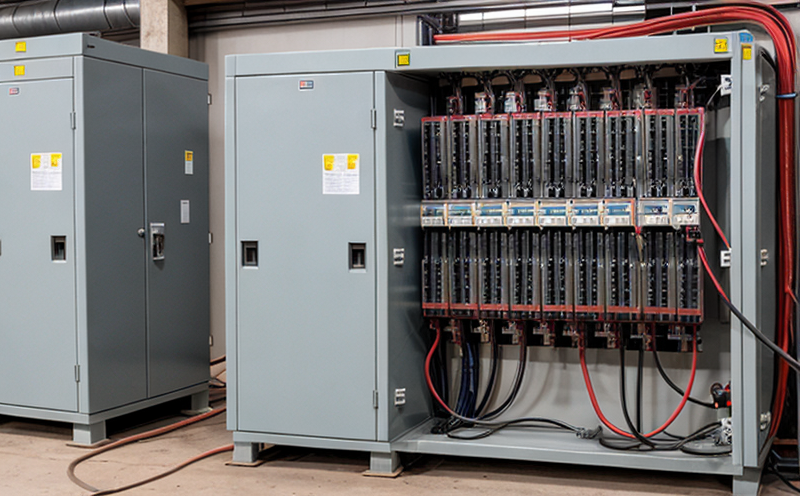ASTM D150 Dielectric Constant Testing of Transformer Insulation
The ASTM D150 standard provides a method to determine the dielectric constant (also known as relative permittivity) of transformer insulation materials. This property is crucial for assessing the electrical performance and durability of insulating materials used in transformers, which play a critical role in power distribution networks.
Understanding the dielectric properties of transformer insulation is essential for ensuring the safe operation and reliability of power systems. Transformers are designed to step up or down voltage levels, and their insulation must withstand high electrical stresses without failure. By measuring the dielectric constant using ASTM D150, engineers can identify potential weaknesses in the insulation material early on, preventing costly failures.
The test procedure involves applying a specific frequency of alternating current (AC) to the specimen and measuring the resulting voltage across it. The relationship between these two quantities provides an accurate determination of the dielectric constant. This value is critical for predicting how well the insulation will perform under various operating conditions, such as high temperature or humidity.
The precision of ASTM D150 testing ensures that manufacturers can select materials with appropriate dielectric properties, thereby enhancing the overall performance and longevity of transformers. Additionally, this test supports compliance with international standards like IEC 60270 and IEEE C57.131, which specify requirements for transformer insulation.
Accurate measurement of dielectric constant is also vital for quality assurance (QA) processes in the manufacturing industry. By incorporating ASTM D150 testing into their QA protocols, companies can ensure that each batch of insulation meets stringent performance criteria before being integrated into transformers.
In summary, ASTM D150 dielectric constant testing serves as a cornerstone for assessing transformer insulation quality and reliability. It enables manufacturers to choose the right materials, meet regulatory requirements, and deliver products that contribute to safer, more efficient power distribution systems.
Customer Impact and Satisfaction
Our ASTM D150 dielectric constant testing service directly impacts customer satisfaction by ensuring the highest quality of transformer insulation materials. By adhering to this rigorous standard, we help our clients meet regulatory requirements while enhancing product performance.
For quality managers and compliance officers, this service translates into peace of mind knowing that all purchased or manufactured materials comply with industry best practices. R&D engineers benefit from having reliable data for material selection and development. Procurement teams can rest assured that they are obtaining superior products through our testing process.
The accuracy and consistency provided by ASTM D150 testing contribute significantly to customer satisfaction, as it reduces the likelihood of product failures in real-world applications. This reliability fosters long-term relationships with satisfied customers who trust us for delivering high-quality services.
Moreover, our commitment to this standard helps ensure that transformers perform optimally under various environmental conditions, further enhancing overall customer satisfaction and confidence in our offerings.
Environmental and Sustainability Contributions
Incorporating ASTM D150 dielectric constant testing into your quality assurance (QA) protocols not only benefits immediate product performance but also contributes positively to environmental sustainability. By selecting materials that meet these stringent standards, you are supporting the development of more efficient and reliable power distribution systems.
The improved durability provided by high-quality insulating materials leads to reduced maintenance needs and lower lifecycle costs for transformers. This efficiency translates into less waste generated during decommissioning processes, contributing to a cleaner environment. Furthermore, compliant products help utilities comply with environmental regulations, promoting sustainable practices within the industry.
Our service plays a role in reducing energy consumption by ensuring that transformers operate at peak efficiency, which ultimately results in lower carbon footprints across the power sector. By adhering to ASTM D150 and other relevant standards, we contribute to broader efforts towards environmental stewardship and sustainability.
Competitive Advantage and Market Impact
By incorporating ASTM D150 dielectric constant testing into your QA protocols, you gain a significant competitive advantage in the power & utilities market. This service ensures that your products meet or exceed industry benchmarks, demonstrating your commitment to quality and reliability.
Customers value consistency and reliability when purchasing transformers; our rigorous testing process helps establish trust and credibility within the marketplace. Compliance with international standards like ASTM D150 and IEC 60270 enhances your reputation as a leader in this field, attracting new business opportunities and solidifying existing customer relationships.
The enhanced performance of your products due to precise ASTM D150 testing also positions you ahead of competitors who may not adhere to these stringent standards. This competitive edge translates into higher customer satisfaction and increased market share, contributing to sustained growth in the power & utilities sector.





